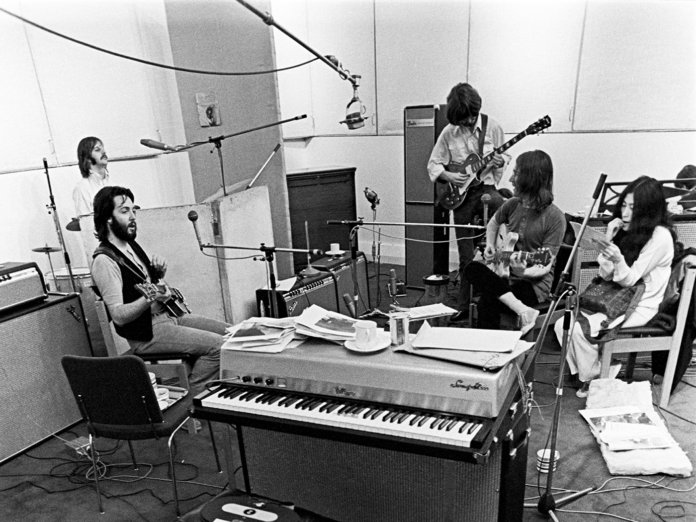The Beatles, then, as you’ve only partially seen them before. For four years, Lord Of The Rings director Peter Jackson has been given sole access to 60 hours of previously unseen footage and 150 hours of audio of the band writing, rehearsing and performing Let It Be, captured for Michael Lindsey-Hogg’s 1970 film. In The Beatles: Get Back, his seven-plus hour, three-episode digital reconstruction of the turbulent events of January 1969, he throws light on areas that Lindsey-Hogg’s documentary wasn’t allowed to go: George’s departure, candid conversations, early takes on future Abbey Road tracks and solo songs, the rooftop swansong in full and enough larks and antics to make being in The Beatles in ‘69 almost look like it was still fun.
Why were you the right man for this epic job?
PETER JACKSON: I’m a certainly a Beatles fan. I think whoever did this film, they needed to be a Beatles fan because you’re dealing with so much material, 130, 140, 150 hours of audio… the sound tapes we’re just rolling virtually all the time. Over the last four years when I’ve been working on this, I do feel like I’m eavesdropping in some sort of CIA-type way on conversations of 52 years ago. And because I’m a Beatles fan, I understand the nuances and the relevance of a lot of little things that they talk about.
What surprised you about the footage?
The fact that Michael Lindsay-Hogg shot this footage 52 years ago and a vast majority of it has been in a vault for 52 years. As a Beatles fan, my mind is still blown at the fact that this actually exists.
There’s an interesting duality at play: you can see them putting their foot down about certain decisions, but no one says “Twickenham, this is just the worst place to possibly be creating…”
They have this wonderful running battle with Michael Lindsay-Hogg, the director. Michael is determined to try to capture as much candid material as he can. There’s this on-going battle between Michael and The Beatles, ’cause they’re aware that he’s doing this. Michael employs some techniques to try to get them on film in much more of a candid way. He would get the cameraman to set up the tripod, set up a shot, press the button and then walk away as if they’re off to have a cup of tea. And the camera would have a 10-minute roll of film in it, and it would just be quietly rolling. He used to put some tape over the red light. And Michael would also hide microphones everywhere to try to capture candid conversations. What John and George used to do is if they were in a conversation, they would turn their amps up loud and they’d strum the guitar. So all Michael’s microphones were recording was this loud guitar. What we’ve been able to do with artificial intelligence-based technology is strip the guitars off now and expose the private conversations that they had. Some key parts of our movie feature private conversations that they tried to disguise or tried to cover up at the time that he was recording them.
What was revealed to you about them?
We only think we know The Beatles. We’ve seen A Hard Day’s Night and Help!. We’ve seen them perform on stage in The Cavern and Shea Stadium. We’ve seen interviews or press conferences. When you think about it, those are all performance situations. When they don’t know they’re being filmed you are getting a 100 percent pure look at the real guys, which doesn’t really exist on film, particularly, anywhere else. We think of The Beatles being a unit. There’s this commercialization of The Beatles in the ’60s, the four mop tops, one’s the witty one, one’s the charming one, one’s the quiet one, they had their little labels. But they were kind of a unit. And here we see that they’re not a unit; they’re just four guys, four separate human beings, just like any four people are. They have their own opinions. They deal with things in a different way. I came away respecting them more…thinking they’re actually pretty decent, sensible guys. There’s no ego. There’s no prima donna. They have disagreements. They have different ambitions. They’re different people. But they’re four decent Liverpool lads.
What did Paul and Ringo think about it coming together?
Obviously, they famously didn’t like the result of [Lindsay-Hogg’s original] film. They just didn’t like being seen behind the camera… So I was thinking ‘how much of this am I gonna get?’ because The Beatles are famously in control of their image, in control of how they come across. [But] I get the feeling that history has arrived…and there’s no concern about their image anymore. One of them said that they watched it and found it one of the most stressful experiences of their entire life, ‘But I’m not gonna give you any notes.’ They’re a little nervous… there’s a degree of courage on their part. They’re pulling the curtain away…now they haven’t got Let It Be at 80 minutes long, they’ve got a supercharged version of it with a lot more controversial stuff in it. We show you George leaving. One of the best comments that I had was from Paul, when he saw it. He said to me, “That is a very accurate portrait of how we were then.” That’s what Ringo said too, he says it’s truthful. The truthfulness of it is important to them. They don’t want a whitewash. They don’t want it to be sanitized. So I think history has overtaken their concern about their image. It’s minted in history and culture. I think they feel that they can now afford to let the world see a little bit more truthfulness than what they’ve ever seen before.
The Beatles: Get Back launches on Disney+ on November 25



